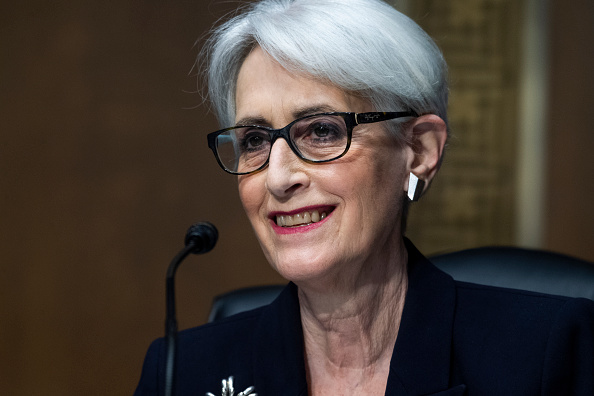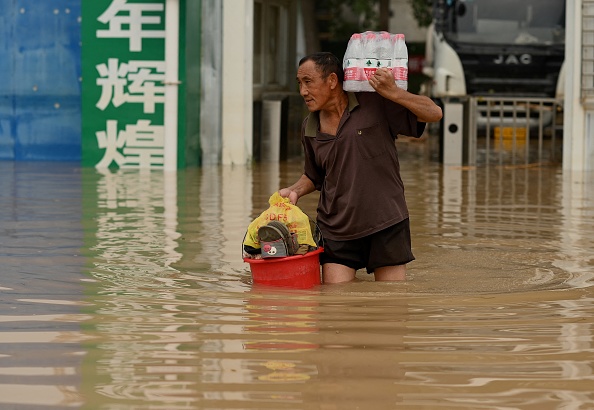
 A Climate for Change
A Climate for ChangeNext week, U.S. Deputy Secretary of State Wendy Sherman will head to China as part of her ongoing East Asia tour where she'll meet with Chinese officials, including State Councilor and Foreign Minister Wang Yi. China's Foreign Ministry spokesperson Zhao Lijian made clear that China will continue to safeguard its sovereignty, security, and development interests, while the U.S. hopes to express concerns about PRC actions, and discuss mutual interests, such as climate collaboration.
Sherman is the second official from the new administration to visit China, following Climate Envoy John Kerry's visit in April that marked climate as central to the Biden administration's strategic approach to bilateral ties.
This week, Kerry gave a speech in London, calling for China to join the U.S. in further cutting emissions, emphasizing that the climate crisis is the test of our times. Kerry said that on climate, "cooperation is the only way to break free from the world's current mutual suicide pact."
While China has continued to slash carbon emissions, including the launch of the world's largest carbon trading market, U.S. Democratic lawmakers are proposing a carbon border tax on imports from China and other countries, which could raise $16 billion in taxes. The proposed tax would cover steel, iron, and other imports from countries that are not significantly reducing emissions. A few Republican lawmakers have also considered a carbon border tariff as a move to safeguard U.S. industries and counter Beijing.
 Under Water
Under WaterHeavy rains hammered the central Chinese province of Henan this week, where its capital city, Zhengzhou, experienced half a year's worth of rain in one hour. Highways were closed, public transportation was halted, and flights were canceled. Videos of residents trapped in rising water on the Zhengzhou subway flooded the internet, along with footage of citizens traversing the city in waist-high water. Officials have reported at least 33 people dead, though numbers are expected to increase, and hundreds of thousands have been forced to relocate.
The impact of the downpour also spread to the global supply chain, as Zhengzhou is home to the producers of Apple and Nissan, whose factories were subject to major power outages. Key plants and partners of both companies had to modify their production schedules and calculate their losses. Xinhua News Agency reported that economic losses across the province are estimated at around $186.6 million.
As scientists across the globe look to the cause of the torrential rain, China climate expert, Deliang Chen, emphasized that there's been an increase in water vapor in the atmosphere because of global warming, which often leads to heavier rainfall. Scientists have also noted similarities in the deadly floods in China and those that have devastated parts of Europe over the last few weeks, both serving as harsh reminders that climate change is catalyzing more extreme weather around the world.
 Cyber Aggressions
Cyber AggressionsThe Biden administration, NATO, and the EU issued a joint statement accusing China of a state-sponsored cyberattack on a widely-accessed Microsoft email server, the latest incident in an ongoing series of global tech-related tensions. The attack was said to have occurred in March, targeting small- to medium-sized businesses, which the U.S. and its allies say were selected for sensitive information to aid China's economy. U.S. officials said the number of nations rallying together represents "the largest condemnation of China's cyber aggressions to date."
The U.S. has yet to penalize China for its alleged role in the attacks, as the Biden administration debates whether or not to impose sanctions and what those sanctions would look like. This is a stark contrast from April, when U.S. officials named Russia as the perpetrator of a massive hacking campaign, which quickly resulted in a series of sanctions on Russian businesses and 10 diplomats expelled from the Russian embassy in Washington.
China's embassy spokesman in Washington, Liu Pengyu, stressed that the Chinese government was not engaged in the cyberattacks and that the relevant personnel never engages in such activities. He also stated that the allegations were "irresponsible," "ill-intentioned," and ultimately groundless claims.
Prepared by China-US Focus editorial teams in Hong Kong and New York, this weekly newsletter offers you snap shots of latest trends and developments emerging from China every week, while adding a dose of historical perspective.
- 2021-07-16 The Trade Game
- 2021-07-09 Existential Threats
- 2021-07-01 Centenary Celebrations
- 2021-06-25 Critical Crossroads
- 2021-06-18 Part of the Club
- 2021-06-11 Retaliatory Legislation
- 2021-06-04 "Defanging" Diplomacy
- 2021-05-28 The End of an Era?
- 2021-05-21 One Step Forward, One Step Back
- 2021-05-14 Drifting Trade Ties
- 2021-05-07 Time to Talk
- 2021-04-30 Academic Pandemic
- 2021-04-23 Carbon Cutting
- 2021-04-16 A Hopeful Climate
- 2021-04-09 Technological Frontiers
- 2021-04-02 Back to Basics
- 2021-03-26 The Biden Era
- 2021-03-19 “A Strong Smell of Gunpowder and Drama”
- 2021-03-12 Bridging the Divide
- 2021-03-05 A Tale of Two AI Superpowers
